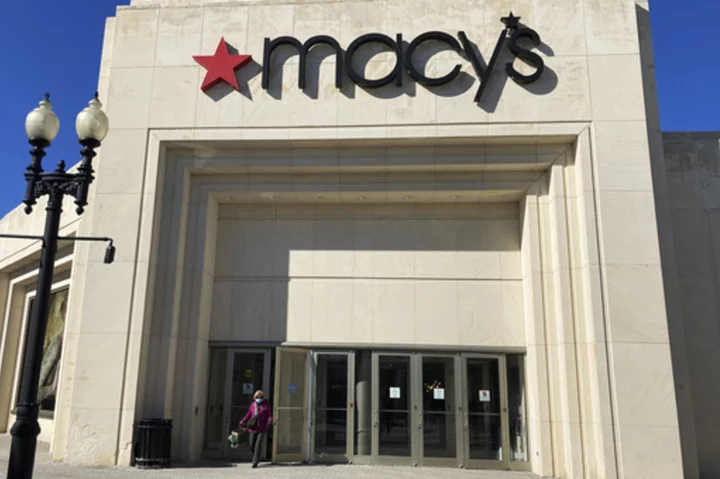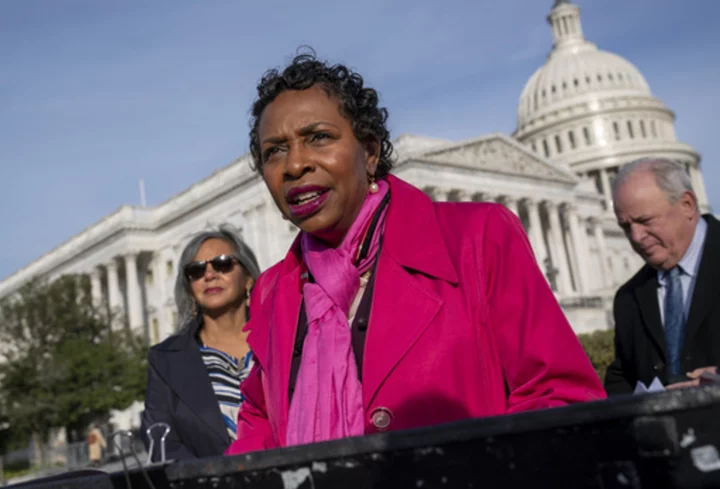NEW YORK (AP) — Macy’s heavily discounted its spring goods to make room for fall and holiday merchandise in the face of customers' cautious spending, but the retailer's adjusted second-quarter profits and sales still topped Wall Street expectations.
Macy's, which also operates upscale Bloomingdale's as well as Bluemercury beauty stores, on Tuesday reaffirmed its annual sales and profits forecasts, while still noting uncertainty about the economy in the second half of its fiscal year. The company cited a faster-than-anticipated rise in credit card delinquencies, signaling more financial pressure for shoppers in the back half of the year.
Macy's also joined many other retailers in flagging uncertainty over the end of the student loan moratorium, which had provided one-time college students a little more financial breathing room.
Shares in Macy's Inc. were down more than 14% in afternoon trading on Tuesday.
“As we plan the remainder of the year and we think about 2024, we remain cautious on the pressures impacting our customer, especially at Macy’s, where roughly 50% of the identified customers have an average household income of $75,000 or under,” CEO Jeff Gennette told analysts during the company's earnings call Tuesday.
Gennette noted that over the past several quarters, he has seen Macy's customers more aggressively pull back on discretionary items and become more intentional in their purchases.
Macy’s is one of the last remaining retailers to report second-quarter results in an earnings season that has shown how still-high inflation, despite some easing, and higher interest rates are forcing shoppers to to cut back on discretionary items like clothing in order to afford their larger grocery bills.
Target reported its first quarterly sales decline in six years last week, dragged down by cautious spending in addition to backlash by some customers to its Pride merchandise.
Home Depot, the nation’s largest home improvement retailer, said last week that sales continue to decline, with a fall-off in big-ticket items like appliances and other things that often require financing. That’s become a problem with interest rates rising rapidly over the past year, making credit cards a much bigger burden for consumers.
But Walmart racked up another strong quarterly sales gain as its low prices continue to attract budget-conscious consumers looking for deals in a tough economic environment. The nation’s largest retailer boosted its annual outlook last week after reporting better-than-expected second-quarter results.
Macy's reported a loss of $22 million, or 8 cents per share, in the quarter ended July 29. That compares with a profit of $275 million, or 99 cents per share, in the year-ago period.
The loss includes a non-cash settlement charge related to the transfer of pension obligations for certain retirees and beneficiaries under the company’s pension plan. Adjusted earnings for the latest quarter were 26 cents per share.
Revenue fell to $5.28 billion from $5.83 billion from a year ago. Analysts had expected a profit of 14 cents on sales of $5.06 billion.
Online sales were down 10% for the quarter, compared with the year-ago period.
Overall, comparable sales — those from stores and digital channels opened at least a year — were down 7.3% in the quarter. The figure includes licensed owned businesses like cosmetics.
Top-performing categories at Macy's included beauty, women’s career clothing and men's tailored clothing. Casual clothing and sleepwear sales remain weak, the company said.
Merchandise inventories were down 10% from a year ago and down 18% compared with 2019, the company said.
Gennette told The Associated Press in an interview Tuesday that despite inflation easing in some areas, shoppers are not yet seeing a benefit. And he noted that while they still have savings, he's seeing that more of their pocketbook is going toward services and experiences.
In a separate announcement, Macy's said it would open new small format stores in the West and Northeast in a bid to increase customer visits and attract new shoppers. Macy's noted that the small stores opened more than a year posted positive comparable sales, including licensed businesses.
_____
Follow Anne D’Innocenzio: http://twitter.com/ADInnocenzio









